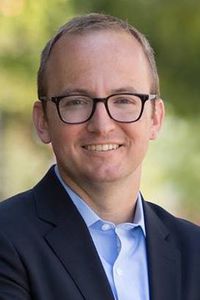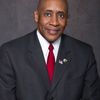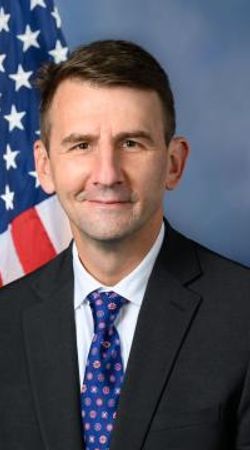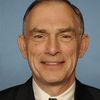Indiana's 1st Congressional District election, 2020 (June 2 Democratic primary)
- Primary date: June 2
- Primary type: Open
- Registration deadline(s): May 4
- Online registration: Yes
- Same-day registration: No
- Early voting starts: May 26
- Absentee/mail voting deadline(s): June 2 (received)
- Voter ID: Photo ID
- Poll times: 6 a.m. to 6 p.m.
2022 →
← 2018
|
| Indiana's 1st Congressional District |
|---|
| Democratic primary Republican primary General election |
| Election details |
| Filing deadline: February 7, 2020 |
| Primary: June 2, 2020 General: November 3, 2020 Pre-election incumbent: Peter Visclosky (Democratic) |
| How to vote |
| Poll times: 6 a.m. to 6 p.m. Voting in Indiana |
| Race ratings |
Inside Elections: Solid Democratic Sabato's Crystal Ball: Safe Democratic |
| Ballotpedia analysis |
| U.S. Senate battlegrounds U.S. House battlegrounds Federal and state primary competitiveness Ballotpedia's Election Analysis Hub, 2020 |
| See also |
1st • 2nd • 3rd • 4th • 5th • 6th • 7th • 8th • 9th Indiana elections, 2020 U.S. Congress elections, 2020 U.S. Senate elections, 2020 U.S. House elections, 2020 |
Frank Mrvan defeated 14 other candidates to win the Democratic nomination in Indiana's 1st Congressional District on June 2, 2020. Mrvan received 33.7% of the vote to Thomas McDermott Jr.'s 29.2%. No other candidate received more than 10% of the vote. This was the first time the seat had been left open since Rep. William Schulte (D) was first elected in 1932. 18-term incumbent U.S. Rep. Pete Visclosky (D) did not seek re-election in 2020. Visclosky was first elected in 1984 after defeating Katie Hall (D) in that year's Democratic primary.
Five candidates—Sabrina Haake, Jim Harper, Frank Mrvan, Thomas McDermott Jr., and Mara Candelaria Reardon— raised over $200,000.
Of those five, Mrvan, McDermott, and Reardon held elected office at the time of the primary. Mrvan was the North Township Trustee, first elected to that position in 2005. McDermott served as the mayor of Hammond. Reardon was first elected to the Indiana House of Representatives in 2006 and served until 2014. She was re-elected in 2016. Harper and Haake, both attorneys, have not held elected office.
Incumbent Rep. Visclosky endorsed Mrvan, former U.S. Sen. Joe Donnelly (D-Ind.) endorsed McDermott, and the Congressional Hispanic Caucus' BOLD PAC endorsed Reardon.[1][2][3] Haake received an endorsement from the National Organization for Women PAC and Harper was endorsed by Our Revolution.[4][5]
Melissa Borom, Carrie Castro, Scott Costello, Antonio Daggett Sr., Ryan Farrar, John Hall, Ryan Lamb, Wendell Mosby, Jayson Reeves, and Andrew Sylwestrowicz also ran in the primary.
At the time of the primary, Democrats had held the 1st District in its northwestern Indiana location continuously since 1933. In each of his 18 general elections, Rep. Visclosky won with over 60 percent of the vote in all but two cycles: 1994 (56-44%) and 2010 (59-39%). Following the 2018 elections, Democrats held a majority in the U.S. House of Representatives with 235 seats compared to the 200 held by Republicans. Click here to learn more about what's at stake in the general election.
Sabrina Haake participated in a Candidate Conversation with Ballotpedia and EnCiv. Click here to watch.
Click on candidate names below to view their key messages:
 Haake |
 Harper |
 McDermott |
 Mrvan |
 Reardon |
This page focuses on Indiana's 1st Congressional District Democratic primary. For more in-depth information on the district's Republican primary and the general election, see the following pages:
 Indiana's 1st Congressional District election, 2020 (June 2 Republican primary)
Indiana's 1st Congressional District election, 2020 (June 2 Republican primary) Indiana's 1st Congressional District election, 2020
Indiana's 1st Congressional District election, 2020
Election procedure changes in 2020
Ballotpedia provided comprehensive coverage of how election dates and procedures changed in 2020. While the majority of changes occurred as a result of the coronavirus (COVID-19) pandemic, some changes occurred for other reasons.
Indiana modified its primary election process as follows:
- Election postponements: The primary election was postponed from May 5, 2020, to June 2.
- Voting procedures: All voters were allowed to cast their ballots by mail in the primary election.
- Political party events: Both the Democratic and Republican parties of Indiana canceled their in-person state conventions. The parties opted instead to conduct convention business virtually and by mail.
For a full timeline about election modifications made in response to the COVID-19 outbreak, click here.
Candidates and election results
Democratic primary election
Democratic primary for U.S. House Indiana District 1
Candidate | % | Votes | ||
| ✔ |  | Frank Mrvan | 32.8 | 29,575 |
 | Thomas McDermott Jr.  | 28.2 | 25,426 | |
 | Jim Harper | 10.1 | 9,133 | |
| Melissa Borom | 8.7 | 7,792 | ||
 | Mara Candelaria Reardon | 7.8 | 6,997 | |
 | Sabrina Haake  | 4.8 | 4,365 | |
| Carrie Castro | 1.5 | 1,330 | ||
| John Hall | 1.4 | 1,223 | ||
 | Scott Costello  | 1.3 | 1,126 | |
 | Antonio Daggett Sr. | 1.1 | 965 | |
| Wendell Mosby | 1.0 | 893 | ||
| Jayson Reeves | 0.6 | 526 | ||
| Andrew Sylwestrowicz | 0.4 | 396 | ||
 | Ryan Farrar | 0.3 | 297 | |
| Total votes: 90,044 | ||||
 = candidate completed the Ballotpedia Candidate Connection survey. = candidate completed the Ballotpedia Candidate Connection survey. | ||||
| If you are a candidate and would like to tell readers and voters more about why they should vote for you, complete the Ballotpedia Candidate Connection Survey. | ||||
Do you want a spreadsheet of this type of data? Contact our sales team. | ||||
Watch the Candidate Conversation for this race!
Candidate profiles
This section includes candidate profiles created in one of two ways. Either the candidate completed Ballotpedia's Candidate Connection survey or Ballotpedia staff created a profile after identifying the candidate as noteworthy.[6] Ballotpedia staff compiled profiles based on campaign websites, advertisements, and public statements.

Party: Democratic Party
Incumbent: No
Submitted Biography: "I am a social worker and my candidacy is to fight for the working class which is horribly under-represented in Congress where 98% of elected officials are from the upper classes. Every-day Americans are struggling - 40% of Americans have less than $400 in the bank - 400 richest families own more wealth than 60% of Americans. We cannot continue with extreme income disparity. We are a consumer-based economy and our purchasing power is decreasing every year, meanwhile China's markets are booming and American corporations continue to invest there and no here. All of our nation's net economic growth has been in California, all other areas have been flat since 2008. Areas that have increased the minimum wage have seen no job loss and improved economies. We also need to invest in sustainable energies, infrastructure and reduce carbon emissions. Finally, all Americans deserve affordable healthcare. I believe in Medicare for All. "
![]()
This information was current as of the candidate's run for U.S. House Indiana District 1 in 2020.

Party: Democratic Party
Incumbent: No
Submitted Biography: "I'm a proud, longtime Gary homeowner, Indiana public schools graduate, lawyer, doggy rescue mom and your candidate for Congress. I'm not a politician. And that should excite you. In 2018, 70% of the newly elected Democratic members of Congress never held a political office before. It's time for a new voice! As our next member of Congress I'll fight hard every day for Northwest Indiana. My NWI:Off the Grid renewable energy plan has bi-partisan support and will bring 40,000 new jobs to our region. I will fight for access to quality, affordable healthcare, and education reform so that our children have a great future. "
![]()
This information was current as of the candidate's run for U.S. House Indiana District 1 in 2020.

Party: Democratic Party
Incumbent: No
Political Office: None
Biography: Harper received a bachelor's degree in political science and economics from Indiana University Bloomington and a J.D. from Georgetown University. He co-founded a non-profit law firm representing veterans seeking disability benefits. In 2016, Harper began private practice at Harper & Harper, LLC. He was the Democratic nominee for secretary of state in 2018.
Show sources
Sources: NWI Times, "Meet the candidates vying to represent Northwest Indiana in Congress," February 16, 2020, Facebook, "Hammond FOP #51's 1st Indiana Congressional District Candidates Forum," February 17, 2020, YouTube, "Jim Harper for Congress," November 13, 2019, Facebook, "NO DARK MONEY," May 18, 2020; Harper's 2020 campaign website, "About Me," accessed May 29, 2020
This information was current as of the candidate's run for U.S. House Indiana District 1 in 2020.

Party: Democratic Party
Incumbent: No
Political Office:
Mayor of Hammond, Indiana (assumed office: 2004)
Submitted Biography: "In 2004, I was the youngest mayor ever elected in Hammond, Indiana. Now, 16 years later, I am the longest serving mayor in the city's history. My proudest achievements of my 16 years as mayor include the College Bound Scholarship program, a city-wide commitment to youth sports, and the creation of the Wolf Lake Pavilion and recreation area. As a young man, I enlisted in the United States Navy and served 6 years as a nuclear submariner aboard the USS Hyman G. Rickover (SSN 709). I was honorably discharged and moved back to Hammond, where I attended Purdue-Calumet, and later earned a law degree from the University of Notre Dame in South Bend. I have been named a Sagamore of the Wabash, the highest honor bestowed upon a civilian by the Governor of Indiana. I have served as Deputy Chairman of the Indiana Democratic Party, and as co-chair of the DNC Veterans and Military Families Council. I am a family man. I met my wife, Marissa, at Notre Dame Law School. We have raised four children, Lindsey, Chase, Tommy, and Patrick."
![]()
This information was current as of the candidate's run for U.S. House Indiana District 1 in 2020.

Party: Democratic Party
Incumbent: No
Political Office:
- North Township Trustee (Assumed office: 2005)
Biography: Mrvan received a bachelor's degree in journalism from Ball State University in 1992. He worked as a pharmaceutical sales representative and mortgage broker. Mrvan previously served as president of the Lake County Young Democrats and treasurer of the Highland Democratic Club.
Show sources
Sources: Facebook, "Indiana Families First," May 24, 2020, Mrvan's 2020 campaign website, "About Frank," accessed May 29, 2020, YouTube, "Congressman Visclosky Endorsement," May 29, 2020, NWI Times, "Meet the candidates vying to represent Northwest Indiana in Congress," February 16, 2020, Mrvan's 2020 campaign website, "Issues," accessed May 29, 2020; North Township Trustee website, "Frank Mrvan," accessed May 29, 2020
This information was current as of the candidate's run for U.S. House Indiana District 1 in 2020.

Party: Democratic Party
Incumbent: No
Political Office:
- Indiana House of Representatives (Assumed office: 2016, 2006-2014)
Biography: Reardon received a bachelor's degree from Indiana University Northwest and a J.D. from the John Marshall School of Law in Chicago. She worked as a federal projects coordinator for U.S. Rep. Pete Visclosky (D-Ind.). In 2015, Reardon became a principal at MCR Partners covering non-profit development, political consulting, and government affairs.
Show sources
This information was current as of the candidate's run for U.S. House Indiana District 1 in 2020.
Candidate Conversations
Click below to watch the conversation for this race.
Endorsements
This section lists endorsements issued in this election. If you are aware of endorsements that should be included, please email us.
| Democratic primary endorsements | |||||||||||||||||
|---|---|---|---|---|---|---|---|---|---|---|---|---|---|---|---|---|---|
| Endorsement | Borom | Haake | Harper | McDermott | Mrvan | Reardon | |||||||||||
| Newspapers and editorials | |||||||||||||||||
| The Gary Crusader[1] | ✔ | ||||||||||||||||
| Elected officials | |||||||||||||||||
| South Bend, Ind. Mayor Pete Buttigieg (D)[7] | ✔ | ||||||||||||||||
| U.S. Rep. David Cicilline (D-R.I.)[4] | ✔ | ||||||||||||||||
| U.S. Rep. Jim Clyburn (D-S.C.)[8] | ✔ | ||||||||||||||||
| U.S. Rep. Marcia Fudge (D-Ohio)[8] | ✔ | ||||||||||||||||
| U.S. Rep. Jesus Garcia (D-Ill.)[3] | ✔ | ||||||||||||||||
| Rhode Island Secretary of State Nellie Gorbea (D)[3] | ✔ | ||||||||||||||||
| U.S. Rep. Barbara Lee (D-Calif.)[8] | ✔ | ||||||||||||||||
| U.S. Rep. Seth Moulton (D-Mass.)[9] | ✔ | ||||||||||||||||
| U.S. Rep. Cedric Richmond (D-La.)[8] | ✔ | ||||||||||||||||
| U.S. Rep. Lucille Roybal-Allard (D-Calif.)[3] | ✔ | ||||||||||||||||
| U.S. Rep. Mark Takano (D-Calif.)[4] | ✔ | ||||||||||||||||
| U.S. Rep. Bennie Thompson (D-Miss.)[8] | ✔ | ||||||||||||||||
| U.S. Rep. Pete Visclosky (D-Ind.)[1] | ✔ | ||||||||||||||||
| U.S. Rep. Frederica Wilson (D-Fla.)[8] | ✔ | ||||||||||||||||
| Individuals | |||||||||||||||||
| Former U.S. Sen. Joe Donnelly (D-Ind.)[2] | ✔ | ||||||||||||||||
| Former U.S. Rep. Luis Gutierrez (D-Ill.)[3] | ✔ | ||||||||||||||||
| Former U.S. Rep. Katie Hill (D-Calif.)[3] | ✔ | ||||||||||||||||
| 2020 presidential candidate Marianne Williamson[5] | ✔ | ||||||||||||||||
| Organizations | |||||||||||||||||
| American Federation of State, County and Municipal Employees Council 962[3] | ✔ | ||||||||||||||||
| American Federation of Teachers Indiana[1] | ✔ | ||||||||||||||||
| Brand New Congress[5] | ✔ | ||||||||||||||||
| Congressional Black Caucus PAC[10] | ✔ | ||||||||||||||||
| Congressional Hispanic Caucus BOLD PAC[3] | ✔ | ||||||||||||||||
| Democracy for America[5] | ✔ | ||||||||||||||||
| Indiana Alliance for Retired Americans Indiana[1] | ✔ | ||||||||||||||||
| Indiana Chamber of Commerce[9] | ✔ | ||||||||||||||||
| Indivisible Northwest Indiana[5] | ✔ | ||||||||||||||||
| National Organization for Women PAC[4] | ✔ | ||||||||||||||||
| Our Revolution[11] | ✔ | ||||||||||||||||
| Serve America[12] | ✔ | ||||||||||||||||
| Local 881 United Food and Commercial Workers Union[3] | ✔ | ||||||||||||||||
| VoteVets.org[9] | ✔ | ||||||||||||||||
Timeline
2020
Campaign advertisements
This section shows advertisements released in this race. Ads released by campaigns and, if applicable, satellite groups are embedded or linked below. If you are aware of advertisements that should be included, please email us.
Sabrina Haake
|
|
Jim Harper
|
A sample ad from the candidate's Facebook page is embedded below. Click here to see the candidate's Facebook Video page.
Thomas McDermott
|
|
Frank Mrvan
|
A sample ad from the candidate's Facebook page is embedded below. Click here to see the candidate's Facebook Video page.
Mara Candelaria Reardon
|
A sample ad from the candidate's Facebook page is embedded below. Click here to see the candidate's Facebook Video page.
Satellite group ads
| Click "show" to the right to see satellite group ads. | |
|---|---|
|
Supporting Mrvan[14] | |
Campaign finance
This section contains campaign finance figures from the Federal Election Commission covering all candidate fundraising and spending in this election.[17] It does not include information on fundraising before the current campaign cycle or on spending by satellite groups. The numbers in this section are updated as candidates file new campaign finance reports. Candidates for Congress are required to file financial reports on a quarterly basis, as well as two weeks before any primary, runoff, or general election in which they will be on the ballot and upon the termination of any campaign committees.[18] The chart below contains data from financial reports submitted to the Federal Election Commission.
| Name | Party | Receipts* | Disbursements** | Cash on hand | Date |
|---|---|---|---|---|---|
| Melissa Borom | Democratic Party | $68,500 | $68,500 | $0 | As of December 31, 2020 |
| Carrie Castro | Democratic Party | $0 | $0 | $0 | Data not available*** |
| Scott Costello | Democratic Party | $10,724 | $9,425 | $1,841 | As of December 31, 2020 |
| Antonio Daggett Sr. | Democratic Party | $0 | $0 | $0 | Data not available*** |
| Ryan Farrar | Democratic Party | $0 | $0 | $0 | Data not available*** |
| Sabrina Haake | Democratic Party | $294,264 | $294,264 | $0 | As of June 30, 2020 |
| John Hall | Democratic Party | $0 | $0 | $0 | Data not available*** |
| Jim Harper | Democratic Party | $245,144 | $245,142 | $2 | As of December 31, 2020 |
| Thomas McDermott Jr. | Democratic Party | $652,759 | $652,542 | $217 | As of December 31, 2020 |
| Wendell Mosby | Democratic Party | $0 | $0 | $0 | Data not available*** |
| Frank Mrvan | Democratic Party | $590,635 | $476,407 | $114,228 | As of December 31, 2020 |
| Mara Candelaria Reardon | Democratic Party | $309,877 | $309,877 | $0 | As of August 6, 2020 |
| Jayson Reeves | Democratic Party | $0 | $0 | $0 | Data not available*** |
| Andrew Sylwestrowicz | Democratic Party | $0 | $0 | $0 | Data not available*** |
|
Source: Federal Elections Commission, "Campaign finance data," 2020. This product uses the openFEC API but is not endorsed or certified by the Federal Election Commission (FEC).
* According to the FEC, "Receipts are anything of value (money, goods, services or property) received by a political committee." |
|||||
Satellite spending
- See also: Satellite spending
Satellite spending, commonly referred to as outside spending, describes political spending not controlled by candidates or their campaigns; that is, any political expenditures made by groups or individuals that are not directly affiliated with a candidate. This includes spending by political party committees, super PACs, trade associations, and 501(c)(4) nonprofit groups.[19][20][21]
This section lists satellite spending in this race reported by news outlets in alphabetical order. If you are aware of spending that should be included, please email us.
The following information was gathered from FEC reports and was accurate as of May 30, 2020:
- CHC Bold PAC spent $169,084 supporting Reardon with research services and direct mail.[22]
- Democratic Progress spent $177,480 on print, digital, and television advertisements supporting McDermott.[22]
- Elect Honest Leadership PAC spent $31,087 supporting Mrvan on April 21, 2020.[22]
- Middle Class Values PAC spent $30,127 on digital ads and direct mail supporting Mrvan.[22]
- United Steelworkers Political Action Fund spent $2,594 supporting Mrvan with communications costs and helmet decals.[22]
- Voter Protection Project spent $65,477 on direct mail supporting Reardon and $65,477 opposing McDermott.[22]
- With Honor Fund spent $112,396 on direct mail and digital advertisements supporting McDermott.[22]
Debates and forums
May 27 round table
On May 27, eight candidates participated in a round table hosted by Jordan Wilson on the Politicking application.[15]
|
February 17 candidate forum
On February 17, 2020, 12 candidates participated in a forum hosted by the Hammond Fraternal Order of Police Lodge 51 at the Hammond campus of Purdue University Northwest.
Click the links below for summaries of the debate from:
Primaries in Indiana
A primary election is an election in which registered voters select a candidate that they believe should be a political party's candidate for elected office to run in the general election. They are also used to choose convention delegates and party leaders. Primaries are state-level and local-level elections that take place prior to a general election. Indiana law requires a closed primary, where a voter must be affiliated with a party to vote in that party's primary. This includes if they voted for a majority of that party’s candidates in the last general election or plan to in the upcoming election. However, it is possible for any voter to vote in any party's primary so long as they meet this criteria.[23]
For information about which offices are nominated via primary election, see this article.
What's at stake in the general election?
U.S. House elections were held on November 3, 2020, and coincided with the 2020 presidential election. All 435 House districts were up for election, and the results determined control of the U.S. House in the 117th Congress.
At the time of the election, Democrats had a 232-197 advantage over Republicans. There was one Libertarian member, and there were five vacancies. Republicans needed to gain a net 21 seats to win control of the House. Democrats needed to gain seats or lose fewer than 14 net seats to keep their majority.
In the 2018 midterm election, Democrats had a net gain of 40 seats, winning a 235-200 majority in the House. Heading into the 2018 election, Republicans had a 235-193 majority with seven vacancies.
In the 25 previous House elections that coincided with a presidential election, the president's party had gained House seats in 16 elections and lost seats in nine. In years where the president's party won districts, the average gain was 18. In years where the president's party lost districts, the average loss was 27. Click here for more information on presidential partisanship and down-ballot outcomes.
General election race ratings
- See also: Race rating definitions and methods
Ballotpedia provides race ratings from four outlets: The Cook Political Report, Inside Elections, Sabato's Crystal Ball, and DDHQ/The Hill. Each race rating indicates if one party is perceived to have an advantage in the race and, if so, the degree of advantage:
- Safe and Solid ratings indicate that one party has a clear edge and the race is not competitive.
- Likely ratings indicate that one party has a clear edge, but an upset is possible.
- Lean ratings indicate that one party has a small edge, but the race is competitive.[24]
- Toss-up ratings indicate that neither party has an advantage.
Race ratings are informed by a number of factors, including polling, candidate quality, and election result history in the race's district or state.[25][26][27]
| Race ratings: Indiana's 1st Congressional District election, 2020 | |||||||||
|---|---|---|---|---|---|---|---|---|---|
| Race tracker | Race ratings | ||||||||
| November 3, 2020 | October 27, 2020 | October 20, 2020 | October 13, 2020 | ||||||
| The Cook Political Report | Solid Democratic | Solid Democratic | Solid Democratic | Solid Democratic | |||||
| Inside Elections with Nathan L. Gonzales | Solid Democratic | Solid Democratic | Solid Democratic | Solid Democratic | |||||
| Larry J. Sabato's Crystal Ball | Safe Democratic | Safe Democratic | Safe Democratic | Safe Democratic | |||||
| Note: Ballotpedia updates external race ratings every week throughout the election season. | |||||||||
District analysis
- See also: The Cook Political Report's Partisan Voter Index
- See also: FiveThirtyEight's elasticity scores
The 2017 Cook Partisan Voter Index for this district was D+8, meaning that in the previous two presidential elections, this district's results were 8 percentage points more Democratic than the national average. This made Indiana's 1st Congressional District the 139th most Democratic nationally.[28]
FiveThirtyEight's September 2018 elasticity score for states and congressional districts measured "how sensitive it is to changes in the national political environment." This district's elasticity score was 1.07. This means that for every 1 point the national political mood moved toward a party, the district was expected to move 1.07 points toward that party.[29]
Pivot Counties
- See also: Pivot Counties by state
Five of 92 Indiana counties—5 percent—are Pivot Counties. Pivot Counties are counties that voted for Barack Obama (D) in 2008 and 2012 and for Donald Trump (R) in 2016. Altogether, the nation had 206 Pivot Counties, with most being concentrated in upper midwestern and northeastern states.
| Counties won by Trump in 2016 and Obama in 2012 and 2008 | |||||||
|---|---|---|---|---|---|---|---|
| County | Trump margin of victory in 2016 | Obama margin of victory in 2012 | Obama margin of victory in 2008 | ||||
| Delaware County, Indiana | 13.43% | 3.12% | 14.98% | ||||
| LaPorte County, Indiana | 6.33% | 12.57% | 22.04% | ||||
| Perry County, Indiana | 18.55% | 11.59% | 22.84% | ||||
| Porter County, Indiana | 6.59% | 3.90% | 7.20% | ||||
| Vigo County, Indiana | 14.97% | 0.86% | 15.83% | ||||
In the 2016 presidential election, Donald Trump (R) won Indiana with 56.9 percent of the vote. Hillary Clinton (D) received 37.8 percent. Indiana Gov. Mike Pence (R) was Trump's running mate. In presidential elections between 1900 and 2016, Indiana voted Republican 83.33 percent of the time and Democratic 16.67 percent of the time. In the five presidential elections between 2000 and 2016, Indiana voted Republican four times and Democratic once when it voted for Barack Obama in 2008.
Presidential results by legislative district
The following table details results of the 2012 and 2016 presidential elections by state House districts in Indiana. Click [show] to expand the table. The "Obama," "Romney," "Clinton," and "Trump" columns describe the percent of the vote each presidential candidate received in the district. The "2012 Margin" and "2016 Margin" columns describe the margin of victory between the two presidential candidates in those years. The "Party Control" column notes which party held that seat heading into the 2018 general election. Data on the results of the 2012 and 2016 presidential elections broken down by state legislative districts was compiled by Daily Kos.[30][31]
| In 2012, Barack Obama (D) won 28 out of 100 state House districts in Indiana with an average margin of victory of 32.8 points. In 2016, Hillary Clinton (D) won 25 out of 100 state House districts in Indiana with an average margin of victory of 32.9 points. Clinton won one district controlled by a Republican heading into the 2018 elections. |
| In 2012, Mitt Romney (R) won 72 out of 100 state House districts in Indiana with an average margin of victory of 25.3 points. In 2016, Donald Trump (R) won 75 out of 100 state House districts in Indiana with an average margin of victory of 34.3 points. Trump won six districts controlled by Democrats heading into the 2018 elections. |
| 2016 Presidential Results by state House District ' | |||||||
|---|---|---|---|---|---|---|---|
| District | Obama | Romney | 2012 Margin | Clinton | Trump | 2016 Margin | Party Control |
| 1 | 74.02% | 24.38% | D+49.6 | 69.13% | 26.57% | D+42.6 | D |
| 2 | 91.24% | 8.20% | D+83 | 86.86% | 10.81% | D+76.1 | D |
| 3 | 85.10% | 14.01% | D+71.1 | 76.56% | 20.48% | D+56.1 | D |
| 4 | 46.94% | 51.38% | R+4.4 | 44.02% | 50.44% | R+6.4 | R |
| 5 | 43.96% | 54.42% | R+10.5 | 42.04% | 52.89% | R+10.8 | R |
| 6 | 65.56% | 32.91% | D+32.6 | 62.43% | 32.71% | D+29.7 | D |
| 7 | 49.21% | 49.37% | R+0.2 | 42.98% | 52.50% | R+9.5 | D |
| 8 | 50.73% | 47.97% | D+2.8 | 48.45% | 46.84% | D+1.6 | D |
| 9 | 60.14% | 37.95% | D+22.2 | 51.04% | 43.89% | D+7.1 | D |
| 10 | 58.94% | 39.04% | D+19.9 | 48.29% | 45.87% | D+2.4 | D |
| 11 | 41.85% | 56.39% | R+14.5 | 32.04% | 62.83% | R+30.8 | R |
| 12 | 53.19% | 45.32% | D+7.9 | 51.20% | 44.04% | D+7.2 | D |
| 13 | 34.43% | 63.03% | R+28.6 | 25.19% | 69.21% | R+44 | R |
| 14 | 83.05% | 16.18% | D+66.9 | 77.49% | 19.96% | D+57.5 | D |
| 15 | 46.17% | 52.52% | R+6.4 | 42.67% | 53.12% | R+10.5 | R |
| 16 | 38.06% | 59.58% | R+21.5 | 24.96% | 70.45% | R+45.5 | R |
| 17 | 33.98% | 64.01% | R+30 | 25.85% | 69.06% | R+43.2 | R |
| 18 | 26.77% | 71.19% | R+44.4 | 20.36% | 74.88% | R+54.5 | R |
| 19 | 47.78% | 50.75% | R+3 | 42.72% | 52.73% | R+10 | R |
| 20 | 47.61% | 50.07% | R+2.5 | 34.89% | 59.54% | R+24.7 | R |
| 21 | 39.78% | 58.56% | R+18.8 | 33.73% | 61.94% | R+28.2 | R |
| 22 | 23.30% | 74.84% | R+51.5 | 19.91% | 75.20% | R+55.3 | R |
| 23 | 36.08% | 61.21% | R+25.1 | 24.21% | 70.73% | R+46.5 | R |
| 24 | 31.59% | 66.93% | R+35.3 | 40.35% | 53.30% | R+13 | R |
| 25 | 36.30% | 61.32% | R+25 | 27.19% | 67.54% | R+40.3 | R |
| 26 | 49.86% | 47.78% | D+2.1 | 50.02% | 43.22% | D+6.8 | R |
| 27 | 51.92% | 45.41% | D+6.5 | 48.64% | 44.84% | D+3.8 | D |
| 28 | 27.16% | 71.07% | R+43.9 | 24.52% | 69.75% | R+45.2 | R |
| 29 | 30.84% | 67.12% | R+36.3 | 32.24% | 61.50% | R+29.3 | R |
| 30 | 44.78% | 52.78% | R+8 | 32.84% | 61.89% | R+29.1 | R |
| 31 | 40.25% | 57.59% | R+17.3 | 28.83% | 66.42% | R+37.6 | R |
| 32 | 31.06% | 66.81% | R+35.7 | 23.91% | 70.93% | R+47 | R |
| 33 | 39.69% | 58.25% | R+18.6 | 25.55% | 69.80% | R+44.2 | R |
| 34 | 61.63% | 35.68% | D+25.9 | 52.44% | 41.78% | D+10.7 | D |
| 35 | 41.75% | 56.04% | R+14.3 | 30.87% | 64.18% | R+33.3 | D |
| 36 | 52.89% | 44.86% | D+8 | 41.75% | 53.32% | R+11.6 | D |
| 37 | 35.26% | 63.23% | R+28 | 40.95% | 53.05% | R+12.1 | R |
| 38 | 33.79% | 64.07% | R+30.3 | 23.90% | 71.40% | R+47.5 | R |
| 39 | 32.92% | 65.53% | R+32.6 | 40.88% | 53.34% | R+12.5 | R |
| 40 | 36.23% | 62.08% | R+25.8 | 35.50% | 58.61% | R+23.1 | R |
| 41 | 29.51% | 67.92% | R+38.4 | 22.67% | 71.80% | R+49.1 | R |
| 42 | 39.22% | 58.41% | R+19.2 | 26.29% | 69.50% | R+43.2 | R |
| 43 | 55.30% | 42.73% | D+12.6 | 45.56% | 49.83% | R+4.3 | D |
| 44 | 31.50% | 66.22% | R+34.7 | 21.02% | 74.48% | R+53.5 | R |
| 45 | 36.84% | 61.06% | R+24.2 | 24.84% | 71.19% | R+46.4 | R |
| 46 | 38.55% | 59.25% | R+20.7 | 31.57% | 63.54% | R+32 | R |
| 47 | 29.10% | 68.87% | R+39.8 | 24.16% | 70.65% | R+46.5 | R |
| 48 | 38.56% | 59.90% | R+21.3 | 32.75% | 62.92% | R+30.2 | R |
| 49 | 33.11% | 65.49% | R+32.4 | 32.54% | 63.39% | R+30.9 | R |
| 50 | 33.14% | 65.13% | R+32 | 27.01% | 68.02% | R+41 | R |
| 51 | 34.00% | 63.93% | R+29.9 | 24.48% | 70.78% | R+46.3 | R |
| 52 | 31.00% | 67.27% | R+36.3 | 24.47% | 70.89% | R+46.4 | R |
| 53 | 30.23% | 67.35% | R+37.1 | 23.85% | 70.13% | R+46.3 | R |
| 54 | 38.63% | 58.47% | R+19.8 | 24.91% | 69.53% | R+44.6 | R |
| 55 | 33.15% | 64.51% | R+31.4 | 22.12% | 73.36% | R+51.2 | R |
| 56 | 42.11% | 55.91% | R+13.8 | 33.19% | 62.25% | R+29.1 | R |
| 57 | 30.69% | 67.09% | R+36.4 | 23.49% | 71.18% | R+47.7 | R |
| 58 | 31.41% | 66.58% | R+35.2 | 27.77% | 66.87% | R+39.1 | R |
| 59 | 37.11% | 60.82% | R+23.7 | 31.83% | 62.16% | R+30.3 | R |
| 60 | 39.41% | 58.45% | R+19 | 34.82% | 60.63% | R+25.8 | R |
| 61 | 69.90% | 27.39% | D+42.5 | 75.00% | 20.08% | D+54.9 | D |
| 62 | 40.31% | 57.59% | R+17.3 | 34.37% | 60.99% | R+26.6 | R |
| 63 | 30.08% | 67.97% | R+37.9 | 22.31% | 72.84% | R+50.5 | R |
| 64 | 32.42% | 65.53% | R+33.1 | 24.93% | 70.82% | R+45.9 | R |
| 65 | 34.17% | 63.45% | R+29.3 | 25.48% | 69.95% | R+44.5 | R |
| 66 | 43.12% | 54.94% | R+11.8 | 30.53% | 65.36% | R+34.8 | D |
| 67 | 33.59% | 63.85% | R+30.3 | 20.50% | 75.70% | R+55.2 | R |
| 68 | 28.25% | 69.83% | R+41.6 | 19.20% | 77.08% | R+57.9 | R |
| 69 | 36.52% | 60.78% | R+24.3 | 22.82% | 72.40% | R+49.6 | R |
| 70 | 36.18% | 61.71% | R+25.5 | 27.10% | 68.70% | R+41.6 | R |
| 71 | 50.92% | 47.20% | D+3.7 | 44.56% | 50.60% | R+6 | D |
| 72 | 42.89% | 55.41% | R+12.5 | 38.96% | 56.02% | R+17.1 | R |
| 73 | 36.02% | 61.42% | R+25.4 | 22.93% | 72.72% | R+49.8 | R |
| 74 | 44.73% | 53.00% | R+8.3 | 31.06% | 63.50% | R+32.4 | R |
| 75 | 37.34% | 60.55% | R+23.2 | 28.95% | 66.32% | R+37.4 | R |
| 76 | 39.60% | 58.59% | R+19 | 32.85% | 62.36% | R+29.5 | R |
| 77 | 57.50% | 40.60% | D+16.9 | 52.56% | 42.87% | D+9.7 | D |
| 78 | 37.34% | 61.05% | R+23.7 | 35.16% | 60.59% | R+25.4 | R |
| 79 | 28.95% | 69.22% | R+40.3 | 21.65% | 73.97% | R+52.3 | R |
| 80 | 78.11% | 20.64% | D+57.5 | 74.22% | 22.20% | D+52 | D |
| 81 | 44.14% | 53.80% | R+9.7 | 40.62% | 53.82% | R+13.2 | R |
| 82 | 30.25% | 67.78% | R+37.5 | 21.96% | 73.57% | R+51.6 | R |
| 83 | 31.27% | 67.18% | R+35.9 | 29.98% | 65.17% | R+35.2 | R |
| 84 | 34.51% | 63.98% | R+29.5 | 33.23% | 62.10% | R+28.9 | R |
| 85 | 31.58% | 66.88% | R+35.3 | 27.71% | 67.59% | R+39.9 | R |
| 86 | 57.98% | 40.35% | D+17.6 | 64.62% | 29.75% | D+34.9 | D |
| 87 | 49.95% | 48.31% | D+1.6 | 55.89% | 38.06% | D+17.8 | D |
| 88 | 34.66% | 63.88% | R+29.2 | 37.37% | 57.03% | R+19.7 | R |
| 89 | 47.75% | 50.14% | R+2.4 | 43.77% | 50.93% | R+7.2 | R |
| 90 | 34.68% | 63.24% | R+28.6 | 32.08% | 62.11% | R+30 | R |
| 91 | 37.73% | 59.66% | R+21.9 | 31.71% | 62.40% | R+30.7 | R |
| 92 | 51.81% | 46.05% | D+5.8 | 49.25% | 45.19% | D+4.1 | D |
| 93 | 34.28% | 63.70% | R+29.4 | 32.89% | 61.93% | R+29 | R |
| 94 | 82.54% | 16.46% | D+66.1 | 82.29% | 14.31% | D+68 | D |
| 95 | 77.93% | 21.08% | D+56.8 | 75.26% | 21.28% | D+54 | D |
| 96 | 84.99% | 13.71% | D+71.3 | 83.70% | 12.01% | D+71.7 | D |
| 97 | 53.11% | 44.02% | D+9.1 | 48.46% | 45.17% | D+3.3 | D |
| 98 | 82.27% | 16.60% | D+65.7 | 78.54% | 18.32% | D+60.2 | D |
| 99 | 83.25% | 15.77% | D+67.5 | 80.80% | 15.76% | D+65 | D |
| 100 | 61.83% | 35.60% | D+26.2 | 59.68% | 34.20% | D+25.5 | D |
| Total | 43.94% | 54.15% | R+10.2 | 37.92% | 57.16% | R+19.2 | - |
| Source: Daily Kos | |||||||
District election history
2018
General election
General election for U.S. House Indiana District 1
Incumbent Peter Visclosky defeated Mark Leyva in the general election for U.S. House Indiana District 1 on November 6, 2018.
Candidate | % | Votes | ||
| ✔ |  | Peter Visclosky (D) | 65.1 | 159,611 |
 | Mark Leyva (R) | 34.9 | 85,594 | |
| Other/Write-in votes | 0.0 | 4 | ||
| Total votes: 245,209 (100.00% precincts reporting) | ||||
 = candidate completed the Ballotpedia Candidate Connection survey. = candidate completed the Ballotpedia Candidate Connection survey. | ||||
| If you are a candidate and would like to tell readers and voters more about why they should vote for you, complete the Ballotpedia Candidate Connection Survey. | ||||
Do you want a spreadsheet of this type of data? Contact our sales team. | ||||
Democratic primary election
Democratic primary for U.S. House Indiana District 1
Incumbent Peter Visclosky defeated Antonio Daggett Sr. and Larry Chubb in the Democratic primary for U.S. House Indiana District 1 on May 8, 2018.
Candidate | % | Votes | ||
| ✔ |  | Peter Visclosky | 80.5 | 42,269 |
 | Antonio Daggett Sr. | 11.1 | 5,813 | |
 | Larry Chubb | 8.4 | 4,406 | |
| Total votes: 52,488 | ||||
 = candidate completed the Ballotpedia Candidate Connection survey. = candidate completed the Ballotpedia Candidate Connection survey. | ||||
| If you are a candidate and would like to tell readers and voters more about why they should vote for you, complete the Ballotpedia Candidate Connection Survey. | ||||
Do you want a spreadsheet of this type of data? Contact our sales team. | ||||
Republican primary election
Republican primary for U.S. House Indiana District 1
The following candidates ran in the Republican primary for U.S. House Indiana District 1 on May 8, 2018.
Candidate | % | Votes | ||
| ✔ |  | Mark Leyva | 27.0 | 5,960 |
| John Meyer | 19.6 | 4,328 | ||
 | Roseann Ivanovich | 19.6 | 4,318 | |
| Nicholas Pappas | 19.5 | 4,311 | ||
| David Dopp | 7.6 | 1,680 | ||
| Jeremy Belko | 6.7 | 1,486 | ||
| Total votes: 22,083 | ||||
 = candidate completed the Ballotpedia Candidate Connection survey. = candidate completed the Ballotpedia Candidate Connection survey. | ||||
| If you are a candidate and would like to tell readers and voters more about why they should vote for you, complete the Ballotpedia Candidate Connection Survey. | ||||
Do you want a spreadsheet of this type of data? Contact our sales team. | ||||
2016
Heading into the election, Ballotpedia rated this race as safely Democratic. Incumbent Peter Visclosky (D) defeated John Meyer (R) and Donna Dunn (L) in the general election on November 8, 2016. Visclosky defeated Willie Brown in the Democratic primary on May 3, 2016.[32][33][34]
| Party | Candidate | Vote % | Votes | |
|---|---|---|---|---|
| Democratic | 81.5% | 207,515 | ||
| Libertarian | Donna Dunn | 18.5% | 47,051 | |
| N/A | Write-in | 0% | 17 | |
| Total Votes | 254,583 | |||
| Source: Indiana Division of Elections | ||||
| Candidate | Vote % | Votes | ||
|---|---|---|---|---|
|
|
80% | 77,095 | ||
| Willie Brown | 20% | 19,315 | ||
| Total Votes | 96,410 | |||
| Source: Indiana Secretary of State |
||||
2014
The 1st Congressional District of Indiana held an election for the U.S. House of Representatives on November 4, 2014. Peter Visclosky (D) defeated Mark Leyva (R) and Donna Dunn (L) in the general election.
| Party | Candidate | Vote % | Votes | |
|---|---|---|---|---|
| Democratic | 60.8% | 86,579 | ||
| Republican | Mark Leyva | 35.8% | 51,000 | |
| Libertarian | Donna Dunn | 3.3% | 4,714 | |
| Total Votes | 142,293 | |||
| Source: Indiana Secretary of State Official Results | ||||
State profile
- See also: Indiana and Indiana elections, 2020
Partisan data
The information in this section was current as of May 27, 2020
Presidential voting pattern
- Indiana voted Republican in six out of the seven presidential elections between 2000 and 2024.
Congressional delegation
- Following the 2018 elections, both U.S. Senators from Indiana were Republicans.
- Indiana had two Democratic and seven Republican U.S. Representatives.
State executives
- Republicans held eight of Indiana's 15 state executive offices. Elections for the other offices are nonpartisan.
- Indiana's governor was Republican Eric Holcomb.
State legislature
- Republicans controlled the [Indiana State Senate]] with a 40-10 majority.
- Republicans controlled the Indiana House of Representatives with a 67-33 majority.
Indiana Party Control: 1992-2026
No Democratic trifectas • Eighteen years of Republican trifectas
Scroll left and right on the table below to view more years.
| Year | 92 | 93 | 94 | 95 | 96 | 97 | 98 | 99 | 00 | 01 | 02 | 03 | 04 | 05 | 06 | 07 | 08 | 09 | 10 | 11 | 12 | 13 | 14 | 15 | 16 | 17 | 18 | 19 | 20 | 21 | 22 | 23 | 24 | 25 | 26 |
|---|---|---|---|---|---|---|---|---|---|---|---|---|---|---|---|---|---|---|---|---|---|---|---|---|---|---|---|---|---|---|---|---|---|---|---|
| Governor | D | D | D | D | D | D | D | D | D | D | D | D | D | R | R | R | R | R | R | R | R | R | R | R | R | R | R | R | R | R | R | R | R | R | R |
| Senate | R | R | R | R | R | R | R | R | R | R | R | R | R | R | R | R | R | R | R | R | R | R | R | R | R | R | R | R | R | R | R | R | R | R | R |
| House | D | D | D | R | R | D | D | D | D | D | D | D | D | R | R | D | D | D | D | R | R | R | R | R | R | R | R | R | R | R | R | R | R | R | R |
|
|
| Demographic data for Indiana | ||
|---|---|---|
| Indiana | U.S. | |
| Total population: | 6,612,768 | 316,515,021 |
| Land area (sq mi): | 35,826 | 3,531,905 |
| Race and ethnicity** | ||
| White: | 84.2% | 73.6% |
| Black/African American: | 9.2% | 12.6% |
| Asian: | 1.9% | 5.1% |
| Native American: | 0.2% | 0.8% |
| Pacific Islander: | 0% | 0.2% |
| Two or more: | 2.2% | 3% |
| Hispanic/Latino: | 6.4% | 17.1% |
| Education | ||
| High school graduation rate: | 87.8% | 86.7% |
| College graduation rate: | 24.1% | 29.8% |
| Income | ||
| Median household income: | $49,255 | $53,889 |
| Persons below poverty level: | 18.4% | 11.3% |
| Source: U.S. Census Bureau, "American Community Survey" (5-year estimates 2010-2015) Click here for more information on the 2020 census and here for more on its impact on the redistricting process in Indiana. **Note: Percentages for race and ethnicity may add up to more than 100 percent because respondents may report more than one race and the Hispanic/Latino ethnicity may be selected in conjunction with any race. Read more about race and ethnicity in the census here. | ||
See also
- Indiana's 1st Congressional District election, 2020 (June 2 Republican primary)
- Indiana's 1st Congressional District election, 2020
- United States House elections in Indiana, 2020 (June 2 Democratic primaries)
- United States House elections in Indiana, 2020 (June 2 Republican primaries)
- United States House Democratic Party primaries, 2020
- United States House Republican Party primaries, 2020
- United States House of Representatives elections, 2020
- U.S. House battlegrounds, 2020
External links
Footnotes
- ↑ 1.0 1.1 1.2 1.3 1.4 Mrvan's 2020 campaign website, "Endorsements," accessed May 27, 2020
- ↑ 2.0 2.1 2.2 Facebook, "McDermott for Congress," May 25, 2020
- ↑ 3.0 3.1 3.2 3.3 3.4 3.5 3.6 3.7 3.8 Reardon's 2020 campaign website, "Endorsements," accessed May 27, 2020
- ↑ 4.0 4.1 4.2 4.3 Haake's 2020 campaign website, "Endorsements," accessed May 27, 2020
- ↑ 5.0 5.1 5.2 5.3 5.4 Harper's 2020 campaign website, "Endorsements," accessed May 27, 2020
- ↑ Candidate Connection surveys completed before September 26, 2019, were not used to generate candidate profiles. In battleground primaries, Ballotpedia based its selection of noteworthy candidates on polling, fundraising, and noteworthy endorsements. In battleground general elections, all major party candidates and any other candidates with the potential to impact the outcome of the race were included.
- ↑ 7.0 7.1 Facebook, "McDermott for Congress," May 29, 2020
- ↑ 8.0 8.1 8.2 8.3 8.4 8.5 Borom's 2020 campaign website, "Endorsements," accessed May 27, 2020
- ↑ 9.0 9.1 9.2 McDermott's 2020 campaign website, "Endorsements," accessed May 27, 2020
- ↑ Facebook, "Melissa Borom for Indiana," accessed May 27, 2020
- ↑ 11.0 11.1 Twitter, "Our Revolution," May 22, 2020
- ↑ Email communication with Serve America PAC dated June 25, 2020.
- ↑ 13.0 13.1 YouTube, "Congressman Visclosky Endorsement," May 29, 2020
- ↑ 14.0 14.1 Facebook, "United Steelworkers," May 29, 2020d
- ↑ 15.0 15.1 [www.youtube.com/watch?v=RQLnmB8rfow YouTube, "Politicking Congressional Candidate Roundtable (IN-01)," May 27, 2020]
- ↑ 16.0 16.1 YouTube, "Thank you Northwest Indiana Voters," May 26, 2020
- ↑ Fundraising by primary candidates can be found on the race's respective primary election page. Fundraising by general election candidates can be found on the race's general election page.
- ↑ Federal Election Commission, "2022 Quarterly Reports," accessed March 2, 2022
- ↑ OpenSecrets.org, "Outside Spending," accessed September 22, 2015
- ↑ OpenSecrets.org, "Total Outside Spending by Election Cycle, All Groups," accessed September 22, 2015
- ↑ National Review.com, "Why the Media Hate Super PACs," November 6, 2015
- ↑ 22.0 22.1 22.2 22.3 22.4 22.5 22.6 Federal Election Commission, "Indiana - House District 01," accessed May 27, 2020
- ↑ Indiana General Assembly, "Ind. Code § 3–10–1–6," accessed December 5, 2025
- ↑ Inside Elections also uses Tilt ratings to indicate an even smaller advantage and greater competitiveness.
- ↑ Amee LaTour, "Email correspondence with Nathan Gonzalez," April 19, 2018
- ↑ Amee LaTour, "Email correspondence with Kyle Kondik," April 19, 2018
- ↑ Amee LaTour, "Email correspondence with Charlie Cook," April 22, 2018
- ↑ Cook Political Report, "Introducing the 2017 Cook Political Report Partisan Voter Index," April 7, 2017
- ↑ FiveThirtyEight, "Election Update: The Most (And Least) Elastic States And Districts," September 6, 2018
- ↑ Daily Kos, "Daily Kos Elections' statewide election results by congressional and legislative districts," July 9, 2013
- ↑ Daily Kos, "Daily Kos Elections' 2016 presidential results for congressional and legislative districts," February 6, 2017
- ↑ Indiana Secretary of State, "May 3, 2016 Primary Election," accessed February 8, 2016
- ↑ The New York Times, "Indiana Primary Results," May 3, 2016
- ↑ Indiana Secretary of State, "November 8, 2016 General Election," accessed September 6, 2016







